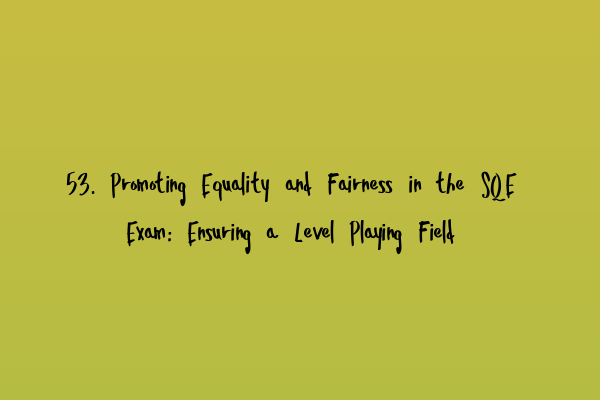53. Promoting Equality and Fairness in the SQE Exam: Ensuring a Level Playing Field
Welcome to this blog post on promoting equality and fairness in the SQE exam. The Solicitors Qualifying Examination (SQE) is a crucial step for aspiring solicitors and it is essential that the examination process is fair and inclusive for all candidates. In this article, we will discuss the importance of promoting equality, provide insights on how to ensure a level playing field, and highlight resources for SQE exam preparation.
Why is Promoting Equality Important?
Promoting equality and fairness in the SQE exam is essential to create a level playing field for all candidates. The legal profession should reflect the diverse society that it serves, and by ensuring equal opportunities in the exam, we can encourage a more representative and inclusive legal community.
Examining bodies, such as the Solicitors Regulation Authority (SRA), are committed to promoting equality and inclusivity by addressing any potential biases or barriers candidates may face. The aim is to provide a fair and transparent process that assesses the knowledge, skills, and abilities required to become a qualified solicitor.
Strategies for Ensuring a Level Playing Field
Here are some strategies to promote equality and fairness in the SQE exam:
- Reviewing Exam Content: It is crucial to regularly review and update the exam content to ensure it aligns with current legal practice. This helps to prevent biases and ensures that all candidates are assessed on the same relevant knowledge and skills.
- Providing Clear Guidelines: Clear and comprehensive guidelines should be provided to candidates, outlining the exam format, expected competencies, and assessment criteria. This helps to ensure that all candidates have a clear understanding of what is expected from them, regardless of their background or circumstances.
- Accommodations for Special Needs: Accommodations should be made available for candidates with special needs or disabilities, ensuring they have equal access to the exam. This may include extra time, assistive technologies, or alternative formats.
- Eliminating Bias: Steps should be taken to identify and eliminate any potential bias in the exam process. This can be done through rigorous item analysis, regular standardization, and training for examiners to minimize subconscious biases.
- Support and Preparation Resources: Providing candidates with access to quality preparation resources, such as practice exam questions and mock tests, can help level the playing field. These resources can be valuable tools for candidates to assess their knowledge and identify areas for improvement.
Resources for SQE Exam Preparation
To help you prepare for the SQE exam and ensure a level playing field, we recommend the following resources:
- SQE 1 Practice Exam Questions
- SQE 1 Practice Mocks FLK1 FLK2
- SQE 2 Preparation Courses
- SQE 1 Preparation Courses
- SRA SQE Exam Dates
These resources can provide valuable support in your SQE exam preparation journey and help you feel confident and prepared on exam day.
Conclusion
Promoting equality and fairness in the SQE exam is vital to ensure a level playing field for all candidates. By implementing strategies to eliminate bias, providing clear guidelines, accommodating special needs, and offering resources for exam preparation, we can create an inclusive and equitable exam process.
To learn more about SQE exam preparation or to access additional resources, visit our website. We are committed to supporting your journey towards becoming a qualified solicitor.
